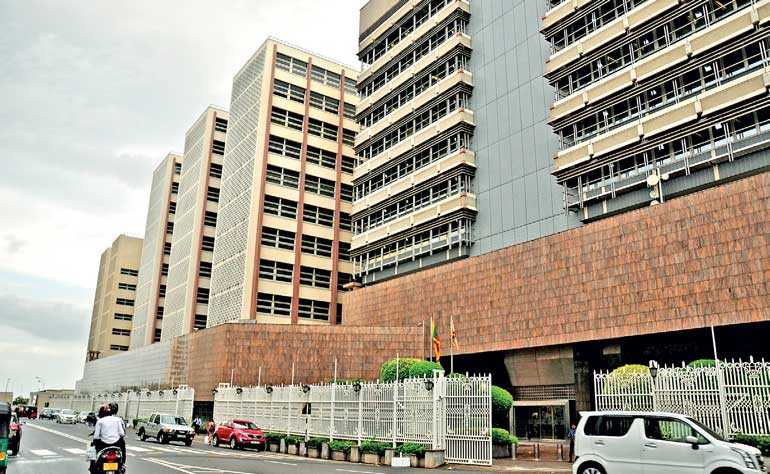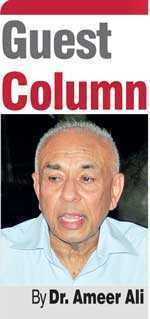Monday Feb 16, 2026
Monday Feb 16, 2026
Tuesday, 16 October 2018 00:00 - - {{hitsCtrl.values.hits}}

The Central Bank (CB) seems to have given up its effort to defend the depreciating rupee. Not that it does not want to but that it cannot because there are no more reserves to gamble with. The CB, however, is trying to put a positive spin on the surrender by agreeing with the Finance Minister that it is good for the export sector.
While global trade is under severe strain due to US-China tariff induced trade war, what hope does Sri Lanka have to increase its exports and to where? The unstoppable globalisation of finance and financialisation of economies has made CBs powerless to control money supply through the conventional instruments of interest rates, reserve ratios and open market operations.
The banking world and money markets are operating in a virtual world and new forms of money are created almost daily. CBs are unable to monitor these activities, let alone controlling them. As one expert describes, “Central Banks have become an institutional anachronism”.
On top of this transformation comes rising interest rates in US which is pushing currencies of emerging markets to tumble. Let us not therefore build hopes that Sri Lanka’s Central Bank can employ monetary controls and stabilise exchange rates. The country should look to other means to arrest the downward spiral.
The southbound journey of the rupee is partly systemic and partly and more importantly due to economic mismanagement. A depreciating rupee and a sliding economy are strongly correlated.
Control imports without hurting the poor
The best and long-lasting solution to stop both is to increase and diversify the nation’s export base. That of course will take time, capital investment and technological transformation, especially in areas where an exportable surplus could be generated and foreign markets for that surplus could be found. Even if foreign investors are enticed to enter in return for extremely advantageous benefits, the turnaround is not going to happen immediately.
On the other hand, one measure that can be implemented immediately, and, which the Government has already started doing is to control imports without hurting the poor. Already, the first wave of import restriction on luxury motor vehicles and white goods has come into effect, and the next wave of restrictions, which will include some basic consumer items, to be justified in the name of austerity, is inescapable.
Curtail public expenditure
The private sector comes into contact with government administration at several points. If an entrepreneur for example, identifies a profit making and market capturing investment opportunity abroad and applies to the relevant ministerial department for approval for his venture that application should be dealt with and responded to without unnecessary delay and additional expenses. Delay may cause the opportunity to pass and expenses will add to the entrepreneur’s cost and reduce competitiveness.
One of the secrets behind Singapore’s economic success is the efficiency of its public administration. In certain areas Singapore’s public sector is even more efficient than its private sector. Both sectors compete in the market to attract the best talent and competitive remuneration and benefits are offered to keep that talent committed to the employer. One of the reasons why foreign investors choose to invest in Singapore is because of the efficiency of its government officers.
Too much waste
There is too much waste in Sri Lanka’s public sector, which is un-affordably overstaffed with underqualified and untrained employees working on low salaries. Many of them are honeymooning to supplement their income invariably through corrupt behaviour. When corruption creeps into the public sector, it reduces the competitiveness and efficiency of the private sector also. From the Government’s Cabinet at the top to its departments and offices at the bottom there is excess personnel and wasteful expenses.
Does Sri Lanka actually need an omnibus Cabinet that it has today? What on earth are these ministers, their deputies, secretaries and attendants, with all their salaries and perks, producing to increase the nation’s GDP? Why is the economy being loaded with this excess baggage when it is struggling to produce enough to sustain this unproductive cadre?
Likewise, wastage through corruption and public maladministration drain all efforts to increase productivity and growth. When the CB itself was caught with daylight robbery and when the culprits were allowed to escape unpunished how can people hold any trust on their Government? Reducing the size of the public sector and improving its efficiency will reduce the budget deficit.
Some of the projects such as the so-called Gamperaliya or model villages are more politically motivated than economically sustainable and therefore are wasteful. When the Government is facing a massive revenue problem how can it afford lavish expenses on rural tamashas without falling into debt? It has to raise revenue through higher taxes or borrow more. Either way, it is going to escalate the cost of living.
Already the masses are increasingly becoming miserable and some family heads are even resorting to suicide to escape from misery. Further increase in cost of living is certainly going to create mass protest with serious law and order consequences. It appears that both the Government and the Opposition are willing to face such an outcome to make political capital out of it.
Fuel pricing woes
In modern economies, transport plays a crucial role and it is an important variable that determines the rate of domestic inflation. In this sense, fuel pricing has become the Government’s nightmare. The Government is deceivingly trying to justify the increase by comparing with what is happening in neighbouring India.
This is a comparison not between two similar economies but between a whale and a minnow. India has the capacity to absorb the increase but not a small open economy with narrow export base like Sri Lanka. When the PM himself declares that he does not have a clue of how the pricing formula operates, what can ordinary citizens expect from his Government? A more efficient and modernised public transport can reduce the demand for private vehicles and reduce demand for fuel import.
Economic development
The solution to the downward spiralling economy has to include even variables outside macroeconomics. No doubt, the country’s export sector has to expand and become intensely competitive and wasteful public expenditure must be curtailed with increase in its productivity. There is also something else that requires speedy attention and solution.
In a plural society, economic development should be the end product of the cooperative and coordinated effort of the different elements that make up that plurality. In the past, Sri Lanka did remarkably well in plurality management which produced a vibrant economy. Even without a written democratic constitution the country was democratic enough to achieve communal harmony, political stability and economic prosperity.
True, Sri Lankan society and polity have become more complex, more locally and internationally integrated and economically more challenging. However, these changes have also affected other plural societies such as Singapore and Malaysia in our neighbourhood.
Singapore produced a statesman like Lee Kwan Yew, who successfully managed the nation’s plurality and left an impeccable legacy for his successors to follow. In Malaysia, Mahathir Muhammad, who, although started his political career as a Malay chauvinist, realised the futility of that policy and has come back as a reformed leader at the ripe old age of 93, with an avowed purpose of cleaning that country of administrative and financial corruption and building a truly democratic society on principles of economic justice and social cohesion.
Sri Lanka desperately needs a statesmanlike political leader who could garner the support of all communities and pull the country out of its current quagmire. With the ones who are now running for power the downward spiral will continue.
(The writer is attached to the School of Business and Governance, Murdoch University, Western Australia.)